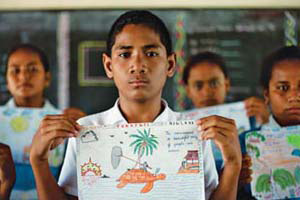
Photo: Wikimedia Commons
Are there low-cost ways to adjust to a warming world? The United Nations’ Local Coping Strategies Database tracks techniques already being used as communities feel the heat.
Problem: Droughts degrading soil quality in Cameroon
Adaptation: Farmers lay the horns of freshly slaughtered cattle in their fields; the horns attract insects, whose secretions fertilize the soil, increasing crop yields by as much as 75 percent. Cost: Free
Problem: Drought in Himachal Pradesh, India
Adaptation: Villagers line ravines with rocks to catch water from a melting glacier—families use what they need and sell their surplus, creating a new, water-based trade economy. Cost: Free
Problem: Floods in northeastern Thailand
Adaptation: Rice farmers once planted during the wet season, but as floods grow more common, they are switching to rice varieties that can be planted in the dry season instead. Cost: Free, thanks to foreign grants
Problem: Stronger and more frequent storms in the Philippines
Adaptation: Low-cost, easy-to-build, storm-resistant houses. Four-sided roofs protect structure from wind; supports anchor each corner to cement foundations. Cost: $1,377 per house
Problem: Growing schistosoma populations in Africa
Adaptation: These parasites cause anemia and malnutrition in 200 million people worldwide. Berries from the desert date tree kill the snails that harbor the parasites. Cost: Free














